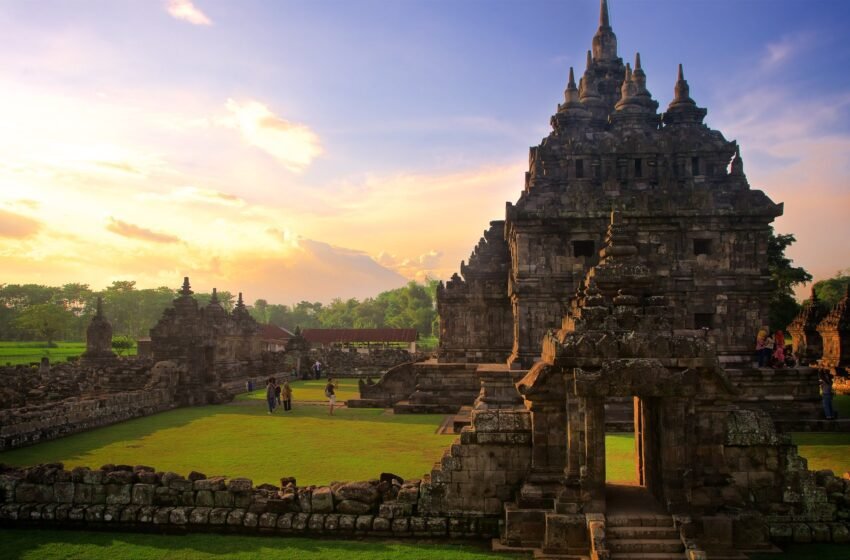Indonesia: A Nation of Diversity and Transformation

Indonesia, the largest archipelago in the world, is a country brimming with diversity and wonder. With more than 17,000 islands scattered across its vast territory, Indonesia is a melting pot of cultures, languages, landscapes, and incredible biodiversity. From the vibrant energy of Jakarta’s streets to the serene beaches of Bali, and from the lush rainforests of Borneo to the dramatic volcanic peaks of Java, this nation offers an extraordinary blend of experiences that both captivate and inspire.
Indonesia sits in the heart of Southeast Asia, straddling the equator and stretching between the Indian and Pacific Oceans. Its prime location has long made it a vital crossroads for maritime trade. The country is made up of a vast archipelago, featuring major islands like Sumatra, Java, Borneo (which it shares with Malaysia and Brunei), Sulawesi, and Papua (shared with Papua New Guinea).
With its tropical climate, Indonesia is home to lush rainforests that host some of the planet’s most extraordinary wildlife. As one of the world’s 17 megadiverse countries, it’s a sanctuary for iconic species such as orangutans, Sumatran tigers, and Komodo dragons. Sadly, this incredible biodiversity is increasingly at risk due to deforestation, urban expansion, and the impacts of climate change.
Indonesia’s history is a rich tapestry shaped by diverse cultures, religions, and civilizations. The story begins with the Austronesian peoples, who migrated from Taiwan around 2000 BCE and settled across the archipelago. Over time, powerful Hindu and Buddhist kingdoms like Srivijaya and Majapahit rose to prominence, leaving behind stunning legacies such as the Borobudur and Prambanan temples.
In the 13th century, Islam began to take root, brought by traders from India and the Middle East, eventually becoming the dominant religion. The 16th century marked the arrival of European powers, starting with the Portuguese, followed by the Dutch, who established control over the region and created the Dutch East Indies. After enduring Japanese occupation during World War II, Indonesia declared its independence on August 17, 1945, and achieved full sovereignty in 1949.
Indonesia is the fourth most populous country in the world, home to over 270 million people. Its population is incredibly diverse, made up of more than 300 ethnic groups who speak over 700 languages. The largest groups include the Javanese, Sundanese, and Batak, while Bahasa Indonesia serves as the national language, uniting this rich tapestry of cultures.
Religion plays a central role in daily life for many Indonesians. While the majority are Muslim, the government officially recognizes six religions: Islam, Protestantism, Catholicism, Hinduism, Buddhism, and Confucianism. This religious diversity is celebrated through vibrant festivals, unique rituals, and cherished traditions that reflect the country’s multicultural spirit.
Indonesian art and culture are vibrant and multifaceted. Traditional dances, such as the Balinese Legong and the Javanese Wayang Kulit (shadow puppetry), showcase the rich cultural heritage. Batik, a traditional fabric-dyeing technique, is recognized as a UNESCO Intangible Cultural Heritage of Humanity. Indonesian cuisine, with its bold flavors and spices, reflects the nation’s cultural melting pot. Dishes like rendang, nasi goreng, and satay are beloved both domestically and internationally.
Indonesia has the largest economy in Southeast Asia and is considered an emerging market with a developing economy. Its GDP is driven by key sectors such as agriculture, manufacturing, mining, and services. Major exports include palm oil, rubber, coffee, and seafood.
In recent decades, Indonesia has seen rapid economic growth fueled by urbanization and industrialization. Cities like Jakarta, Surabaya, and Bandung have become thriving economic centers. However, the country still faces significant challenges, particularly in rural areas where poverty and income inequality persist.
Tourism is another vital part of Indonesia’s economy. Millions of visitors are drawn to its stunning natural landscapes and rich cultural heritage. Bali, famous for its temples and beaches, remains one of the world’s top tourist destinations. But other areas, such as Yogyakarta, Raja Ampat, and Komodo Island, are also gaining increasing attention from international travelers.
Despite its remarkable progress, Indonesia faces several pressing challenges. Environmental degradation, including widespread deforestation and plastic pollution, poses a serious threat to its ecosystems. In urban areas, issues such as traffic congestion, air pollution, and inadequate infrastructure continue to hinder development. Additionally, the country’s archipelagic structure brings about logistical and administrative difficulties, making coordination and delivery of services more complex.
However, Indonesia also has significant advantages. Its youthful population and vast natural resources present substantial opportunities for growth. By investing in education, technology, and renewable energy, the country has the potential to pave the way for sustainable development. Initiatives like the “Making Indonesia 4.0” roadmap are designed to drive innovation and enhance the country’s global competitiveness, laying a strong foundation for the future.
Indonesia holds a significant position on the global stage. As a founding member of ASEAN (Association of Southeast Asian Nations), the country plays an active role in promoting regional stability and fostering cooperation among neighboring nations. Additionally, Indonesia is involved in important international organizations such as the United Nations, the G20, and the Non-Aligned Movement.
Guided by its foreign policy principle of “free and active,” Indonesia focuses on maintaining its independence and avoiding alignment with any major power blocs. Its strategic location and growing economic influence have made it a crucial player in global geopolitics, shaping decisions and relationships both in Southeast Asia and beyond.
Indonesia is a vast and diverse country that stands at a pivotal moment in its journey towards becoming a prominent global player in the 21st century. With its rich history, vibrant culture, and a rapidly expanding economy, Indonesia has made impressive strides in recent decades. Yet, as it continues to evolve, the nation faces several significant challenges that will shape its future. The key to its success will lie in how well it can balance growth with sustainability, urban development with rural progress, and technological innovation with environmental preservation. How Indonesia addresses these challenges will play a major role in determining its position on the world stage moving forward.
Indonesia’s strategic position in Southeast Asia, nestled between the Indian and Pacific Oceans, has long made it a key player in global trade. This central location continues to enhance its influence both regionally and globally. As a founding member of the Association of Southeast Asian Nations (ASEAN) and an active participant in international organizations like the United Nations, the G20, and the Non-Aligned Movement, Indonesia has become a strong advocate for peace, stability, and cooperation within Southeast Asia and beyond.
The country’s foreign policy, known as “free and active,” focuses on maintaining its independence from foreign influence while engaging actively in global affairs. This allows Indonesia to navigate the complexities of an increasingly multipolar world, balancing its relationships with emerging powers while safeguarding its sovereignty. As tensions rise in the Asia-Pacific region, Indonesia’s role as a stabilizing force is more important than ever, and its efforts to mediate conflicts and promote collaboration have bolstered its standing on the international stage. However, as Indonesia’s political and economic influence grows, it will need to carefully manage its non-alignment stance in a world that is becoming more fragmented and competitive.
Indonesia is the largest economy in Southeast Asia and is considered an emerging market with significant growth potential. Over the past few decades, the country has experienced impressive economic development, fueled by industrialization, urbanization, and the growth of key sectors like services, agriculture, and manufacturing. Indonesia is a major exporter of natural resources, including palm oil, rubber, coffee, and seafood. Tourism has also become a crucial part of the economy, with popular destinations like Bali, Jakarta, and Raja Ampat attracting millions of visitors annually, boosting the country’s foreign exchange earnings and creating jobs.
A major strength of the Indonesian economy is its young and dynamic population. With more than 270 million people, Indonesia is the fourth most populous country in the world, and a significant portion of its population is under the age of 30. This demographic advantage presents a unique opportunity for the country to tap into the creativity and energy of its young workforce to drive innovation, digital transformation, and sustainable development. By investing in education, skill development, and access to technology, Indonesia can ensure that its growing labor force is well-prepared to meet the challenges and opportunities of a rapidly evolving global economy.
Indonesia’s economic diversification and industrialization have established it as a major regional power. However, the country still faces several significant challenges. One of the most pressing issues is income inequality, which remains widespread, especially between urban and rural areas. While cities like Jakarta and Surabaya have experienced economic growth and rising prosperity, many rural communities still struggle with poverty, lack of access to education, and limited infrastructure. Addressing this disparity will require focused investments in education, healthcare, infrastructure, and social services to ensure that the benefits of the country’s economic success are shared more equally among all Indonesians.
Urbanization, while offering opportunities for development, also brings its own set of challenges. Indonesia’s cities are growing rapidly, and this urban expansion has led to overcrowding, pollution, and increased strain on existing infrastructure. Jakarta, in particular, faces severe air pollution, traffic congestion, and struggles with water and waste management. As the urban population continues to grow, Indonesia will need to prioritize sustainable infrastructure, clean energy solutions, and smart urban planning to improve the quality of life in its cities while minimizing environmental damage.
Indonesia is one of the world’s most biodiverse countries, home to rich rainforests and unique species like the endangered orangutan, the Sumatran tiger, and the Komodo dragon. Unfortunately, this incredible natural wealth is increasingly under threat. Deforestation, land conversion for agriculture, illegal logging, and mining are all contributing to the destruction of these vital ecosystems. The palm oil industry, while crucial to the economy, has been a major driver of deforestation and habitat loss. Additionally, plastic pollution is becoming a serious problem, especially for marine ecosystems and coastal communities.
These environmental challenges are further compounded by the effects of climate change. Rising sea levels, extreme weather events, and a growing frequency of natural disasters like floods, droughts, and wildfires are not only endangering biodiversity but also putting pressure on Indonesia’s infrastructure and agricultural productivity. To address these issues, Indonesia will need a comprehensive strategy that finds a balance between economic growth and environmental conservation. This means implementing policies that promote sustainable agriculture, support the development of renewable energy, and reduce carbon emissions. Such efforts will be crucial in ensuring that Indonesia’s natural resources are preserved for future generations.
Indonesia has made significant strides in addressing environmental issues, including the implementation of deforestation moratoriums and the promotion of sustainable palm oil certification schemes. However, much more needs to be done to protect the nation’s ecosystems. The government must work closely with international organizations, civil society groups, and the private sector to create and enforce regulations that protect both the environment and the livelihoods of communities dependent on natural resources.
Looking ahead, Indonesia’s future is filled with both challenges and vast opportunities. The country’s rapid economic growth and its youthful, dynamic population offer a strong foundation for continued development. However, to truly unlock its full potential, Indonesia must tackle several pressing issues, including income inequality, the pressures of urbanization, environmental sustainability, and fostering social cohesion.
Indonesia has the potential to become a global leader in areas like innovation, sustainability, and cultural diplomacy. With the right investments in education, technology, renewable energy, and sustainable agriculture, the country can build a more inclusive and sustainable future for its people. Additionally, Indonesia can leverage its position as a regional leader in Southeast Asia to play a central role in shaping the future of the Indo-Pacific region and beyond.
In conclusion, Indonesia is a nation brimming with potential. Its rich cultural heritage, expanding economy, and strategic geopolitical position make it a key player on the world stage. However, the challenges it faces—such as environmental degradation, urban congestion, income inequality, and social tensions—require thoughtful, long-term policies that address both the immediate needs of its people and the broader global issues. By embracing its diversity, investing in sustainable development, and fostering innovation, Indonesia can continue to grow and evolve, becoming a model for emerging nations across the globe.


